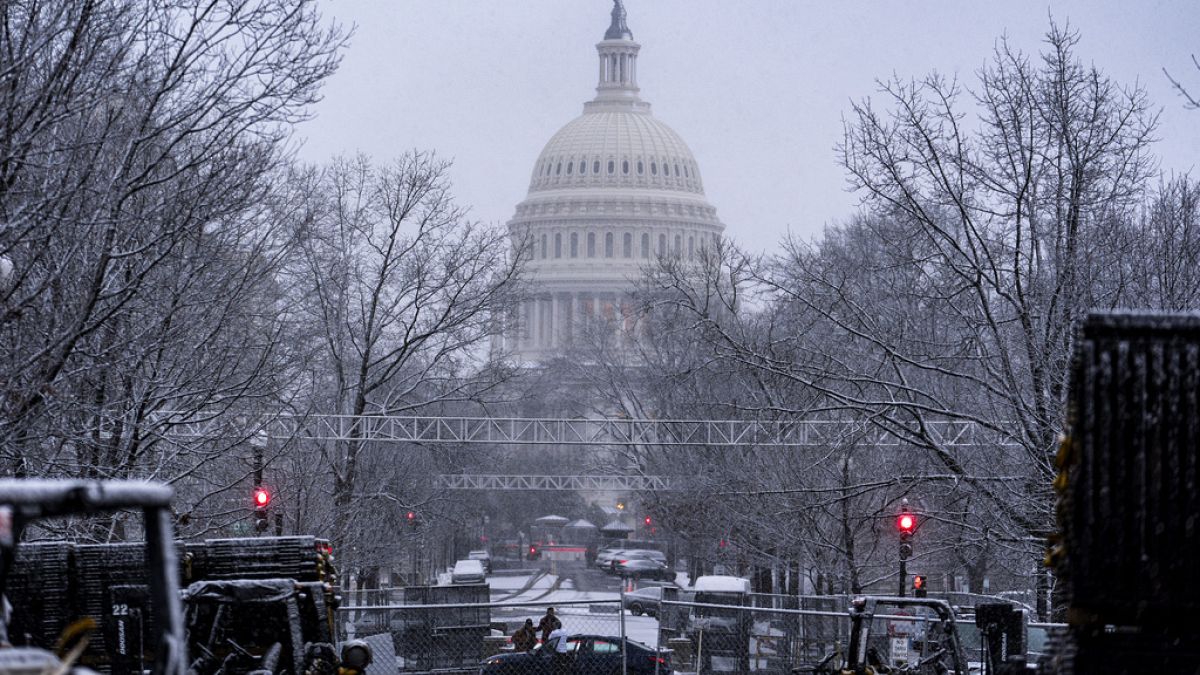Louisiana
Decentralize: How Stephen Waguespack wants to turn the state around if elected next La. governor
/cloudfront-us-east-1.images.arcpublishing.com/gray/MQQBHHKNUFCDVM6JAQ2JLONOAM.jpg)
ALEXANDRIA, La. (KALB) – In less than two months, Louisiana will elect a new governor. Republican candidate Stephen Waguespack hopes to be the one voters put in the state’s highest seat. If they do, Waguespack wants the governor’s office to have less control, giving more control to the state’s regional governments.
”We need a governor who’s not using this office as a stepping stone. We need a governor who’s not using this office as some throne to go acquire to implement power and just own this place,” said Waguespack. “We’ve tried that for 100 years. That is a bankrupt game plan.”
Instead, the self-professed “Conservative problem-solver” said he wants to place more control in people’s hands, having the state capitol work in partnership with regions based on their needs.
For Waguespack, addressing issues in the state is personal, dating all the way back to when he was a kid.
Growing up in Gonzales in the 1970s, Waguespack’s dad ran the local hospital, which was shut down when the 1980s ushered in a financial hit. His mom was a teacher before stepping down to open a clothes store on Main Street. That endeavor did not pan out.
“We were one of those families that kind of limped out of town in the 80s,” explained Waguespack.
Louisiana’s outward migration over the past few decades is driving Waguespack in his bid for governor, now watching from afar as his 20-year-old son attends college in Texas. Waguespack fears he may not return back to his home state.
Much of Waguespack’s campaign has focused on growing jobs and business opportunities, an expected focus having served a decade as CEO of the Louisiana Association of Business and Industries (LABI), a powerful lobbying group representing the interests of the state’s chambers of commerce.
In order to grow those jobs and business opportunities and stifle migration out of Louisiana, which has largely impacted North and Central Louisiana, Waguespack believes the state needs to “decentralize” its government operations.
”Here in Louisiana, ever since the last 100 years, the state tries to be a micro-manager, almost like a nanny for the rest of the state, and it hasn’t worked,” said Waguespack. “So, what I’d like to do is get in there and decentralize, and push some of the power and dollars and authority and control out to local regions. Let them control their own destiny more and not be dependent on a state capitol that has largely ignored them for 100 years.”
Waguespack also wants to see the income tax reduced over time, fewer requirements for small businesses and a reformed education system.
For Louisiana’s schools, Waguespack supports a recurring teacher pay raise, as well as merit pay.
“I think everyone when they go to work, whether your a teacher or a fireman or a law enforcement officer or a news television reporter, you want to know that if you go in there and you do a great job, that there’s an incentive there for you,” said Waguespack. “That’s a natural human instinct. For teachers, it’s no different.”
He also is behind the expanded push for parental choice in schools, backing the new effort to bring Education Savings Accounts (ESA) to Louisiana’s public education system. ESAs would allow students to use the money the state already puts toward each student for other educational options, like private school or homeschooling.
“I think it’s a win-win for everyone,” said Waguespack. “It empowers parents to be involved. It injects competition into the education system, which is good for all of us. And it’ll make dollars more flexible and free up some of those recurring savings to where it could be invested in things like either infrastructure in the school system or even teacher pay.”
As for crime plaguing the state, Waguespack wants to see a number of changes implemented. He wants more technology, like cameras and license plate readers, as well as an increase in police force numbers and pay. He also believes more juvenile facilities need to be constructed to house and rehabilitate juvenile offenders or keep them behind bars.
“This catch-and-release thing we’re doing right now, it’s killing communities. It’s making everyone feel unsafe. We’ve got to stop that turnstile effect we’ve got right now,” said Waguespack.
Waguespack faces 15 other challengers in the 2023 gubernatorial election, which include six major candidates. Leading financially and in the polls is Louisiana GOP-endorsed Jeff Landry. As of July campaign finance reports, Waguespack brought in the second-highest amount of campaign cash, but it is still nearly $7 million less than Landry. He is also polling at around 5%, while Landry and Democrat Dr. Shawn Wilson have held on to a comfortable lead.
Click here to report a typo. Please provide the title of the article in your email.
Copyright 2023 KALB. All rights reserved.

Louisiana
Top 25 Louisiana Boys High School Basketball State Rankings (1/20/2025)

District races have begun in earnest across the state. Some leagues will greatly impact the rankings, such as District 5-5A (Catholic-BR, Liberty, Zachary, Central-BR, Scotlandville and Woodlawn). That league, which only plays one round, hasn’t kicked off yet. The robust Catholic League will showcase a terrific matchup this week in St. Augustine vs. Jesuit on Jan. 24.
There is a small slate of games scheduled for Monday, Jan. 20 (Martin Luther King Jr. Day). Things will grind to a halt on Tuesday and Wednesday with a historic winter storm on the way that will cancel some games and postpone others.
Keep reading to find out our top 25 boys basketball teams in Louisiana.
Previous rank: 1
Power rating: No. 1 (Division I select)
The Bears defeated Dunham, 63-49, in a Baton Rouge city rivalry game. Matthew Hotstream scored 22 points as Catholic built a 15-point halftime lead on the road, according to Charles Salzer of The Baton Rouge Advocate. Senior Tate McCurry added 20 points.
Previous rank: 2
Power rating: No. 2 (Division I select)
The Patriots defeated St. Helena and Glen Oaks. Liberty has a game on Monday, Jan. 20, against Greenforest High (Georgia) at the MLK Classic in Atlanta. Seniors Malek Robinson (14.9 ppg), Chivas Lee (10.3) and Kareem Washington (10.2) are the leading scorers. Washington is shooting 52% from the field. Junior Devin Houston is averaging 9.7 points, 2.4 assists and 2.4 steals per game.
Previous rank: 4
Power rating: No. 1 (Division II select)
The Eagles defeated Woodlawn-BR and McDonogh #35. Shaw erupted for 61 points in the second-half of the 97-61 rout of McDonogh #35, according to Grant Chachere of Crescent City Sports. Freshman Christian Clair posted 20 points. Shaw made 14 3-pointers. Senior Khalil Awogboro also totaled 20 points with five 3s. Kobe Butler and Allen Shaw, who came off the bench, chipped in 15 and 14 points. Triston Naquin was also in double figures (12).
— Archbishop Shaw Basketball (@BasketballShaw) January 18, 2025
Previous rank: 5
Power rating: No. 1 (Division III select)
The Cavaliers defeated Homer, Union Parish and Wossman. Bubba Strong’s triple at the buzzer clipped Wossman, 57-55, in a game played Saturday night at Lincoln Prep in Grambling. Robert Wright (2027) led with 14 points, seven rebounds and two assists, according to Jimmy Watson of The Shreveport Times. Strong had 12 points. Jaiden Hall added 10 points, six rebounds and three assists. G’Marrion Scott tallied seven points and 11 rebounds.
Previous rank: 6
Power rating: No. 3 (Division II select)
The Warhorses defeated Northside, 62-47, and won the Naismith Basketball Hall of Fame Classic with a 50-48 victory vs. Springfield (Mass.) Central. Telek Love scored 12 points and grabbed nine rebounds to nab game MVP honors vs. Springfield. Isaiah Jones had 13 points and nine boards. Braydon Durant finished with six points and 14 rebounds. Hall of Fame coach Charles Smith signed the “iconic Hall of Fame shoe” during the trip.
Previous rank: 7
Power rating: No. 3 (Division I select)
The Cougars defeated Westgate, 62-40, in the District 4-4A opener, and routed Holy Savior Menard in Alexandria, 75-35. STM made a dozen 3-pointers in the win vs. Menard. Eli Deats, one of the primary perimeter shooters, had 15 points. Trenton Potier contributed 12. An important district game at Northside will take place on Jan. 31.
Previous rank: 3
Power rating: No. 1 (Division I nonselect)
The Broncos gained wins over Madison Prep and David Thibodaux sandwiched around an 85-82 double overtime loss to Archbishop Hannan. Sophomore Ian Edmond, who led with 29 points vs. Hannan, scored at least20 points in all three games. Xavier Ferguson added 25 vs. Hannan. For the week, Edmond totaled 10 rebounds, seven assists and five steals, and he took two charges in the game vs. David Thibodaux, which was at Madison Prep on Saturday.
Previous rank: 9
Power rating: No. 2 (Division I nonselect)
The Yellow Jackets secured non-district wins over Baton Rouge area foes Episcopal and Parkview Baptist. Jermaine O’Conner (9 of 14 FG) poured in 23 points in the 68-60 win over Parkview Baptist (14-4), which led at halftime, 36-29. Trae Dorsey’s reverse lay-up put Denham Springs ahead 61-54, according to Will Weathers of The Baton Rouge Advocate.
Previous rank: 10
Power rating: No. 3 (Division I nonselect)
The Wildcats went 3-0 on the week with wins over Donaldsonville, White Castle and Archbishop Rummel. Central pounded Donaldsonville (63-33), which is No. 5 in the Division III nonselect power ratings, with a 10-5 record. Max Tingle and Karter White knocked down 3-pointers in the first quarter of the 73-38 win over White Castle.
Previous rank: 16
Power rating: No. 2 (Division II select)
The Hawks blew out John F. Kennedy, 51-31, which avenged a recent loss to the Cougars. Hannan also won at Zachary, 85-82. AJ Thompson gave the Hawks an 83-82 lead and tacked on two free throws, according to Robin Fambrough of The Baton Rouge Advocate. Drew Timmons had 34 points and 11 rebounds.
Previous rank: 11
Power rating: No. 6 (Division I select)
The Blue Jays defeated Brother Martin and East Jefferson. After trailing by six points entering the fourth quarter, Jesuit outscored Brother Martin, 18-5, to claim a victory at home by a 52-45 margin, according to Ken Trahan of Crescent City Sports. Brewer Nitcher’s 21 points paced the Blue Jays in the non-district win over its Catholic League rival. Ethan Lapeze and Brennan Pitts had eight points apiece.
Previous rank: 12
Power rating: No. 4 (Division I select)
The Trojans defeated Northwest, 66-63, and earned a 52-50 win over Neville in the District 2-5A opener. Jordyn Johnson’s long-range 3 from the top of the key provided ASH with a 21-8 lead vs. Neville, which rallied at home. Marcus Bolden made it 27-22 with another 3. Trey Dorty put the game on ice with a steal.
Previous rank: 13
Power rating: No. 6 (Division II select)
The Blazers won on the road in overtime, 62-59, against Cecilia, and handled LaGrange, 85-42. LCCP beat is previous season high of 70 points. Jaiven Matthews had 23 points. Izayha Brown added 21.
Previous rank: 14
Power rating: No. 5 (Division I select)
The Purple Knights defeated Frederick A. Douglass , Chalmette and Young Audiences Charter. St. Aug won at home (50-48) against Douglass (16-5). Shooting guard Tye Williams recently returned from injury, according to Spencer Urquhart of The New Orleans Advocate.
Previous rank: 8
Power rating: No. 1 (Division II nonselect)
The Wildcats won the District 2-4A opener vs. Tioga, 68-56, with losses to Carroll (61-55) and Calvary Baptist. Wossman is scheduled to travel to Peabody on Jan. 21.
Previous rank: 15
Power rating: No. 10 (Division I nonselect)
The Bearcats defeated West Monroe and Pineville. Sophomore Ahmad Hudson accounted for 28 points and 26 rebounds with six blocked shots in the 73-63 win over West Monroe, according to Matt Belinson of The Ruston Daily Leader. Hudson (6-8) scored 19 points in the fourth quarter as the Bearcats rallied from a five-point third-quarter deficit.
Previous rank: 17
Power rating: No. 2 (Division III select)
The Class 2A Cajuns downed Class 5A Hahnville (57-43) and Edna Karr (59-51). Upcoming opponents include De La Salle (12-5), Vandebilt Catholic (16-5), Madison Prep (14-6), McDonogh #35 (16-6) and H.L. Bourgeois (11-10).
Previous rank: 19
Power rating: No. 4 (Division I nonselect)
The Chiefs defeated Haughton in the District 1-5A opener, 71-27, and are scheduled to travel to small school power Negreet (17-5) this week. Ja’Dell Demery had 15 points and 10 rebounds in the win over Haughton.
Previous rank: 20
Power rating: No. 7 (Division II select)
The Vikings lost at Peabody and defeated Jennings. Northside plays its District 4-4A opener at home vs. St. Thomas More on Jan. 31.
Previous rank: 22
Power rating: No. 6 (Division I nonselect)
The Lions defeated Sterlington and West Monroe. Freshman Darren Ford scored 22 points and made two clutch free throws in the 66-64 Districtr 1-5A win over West Monroe, according to Megan Murray of KNOE-TV.
Previous rank: 23
Power rating: No. 1 (Class B)
The Cardinals defeated Loreauville and St. Louis Catholic. Lacassine exploded for a 49-19 halftime lead vs. Loreauville (11-4) and went on to win, 77-64, according to poster CJR3888 on the Louisiana Sportsline message board. 6-foot-4 Kane Broussard is a top scorer.
Previous rank: Not ranked
Power rating: No. 7 (Division I select)
Ponchatoula is 2-0 in league play with a 63-40 win over Hammond (15-5) and a 96-85 overtime win over Covington (15-5). The Green Wave’s losses have been to teams with a combined record of 75-12. U-High (11-6), which defeated the Wave by three points earlier this month, has half of that group’s setbacks.
Previous rank: Not ranked
Power rating: No. 9 (Division I select)
The Raiders have won five straight games since a loss to Captain Shreve, which it avenged. Against a box-and-one defense, sophomore Peyton Parker helped his team to a win over Carroll with 11 assists, 10 rebounds and four steals, according to The Basketball Tribune X page. 6-foot-6 junior Antonio Dixon is scoring 10.1 ppg and shooting 55%.
Previous rank: 21
Power rating: No. 3 (Division II nonselect)
The Bulldogs lost to Huntington and Wossman and defeated Wossman, showing again that they’re capable of taking down any opponent on a given night.
Previous rank: 18
Power rating: No. 6 (Division II select)
The Chargers snapped a four-game losing streak with a win over Hahnville on Saturday. The last two setbacks – to St. Aug and Zachary – were by one and six points.
Dropped Out: No. 24 John F. Kennedy (17-5), No. 25 Holy Cross (16-3)
Watch List: Sulphur (18-4), Northshore (12-5), East Ascension (15-4), Minden (13-1), Opelousas (12-4) Franklin Parish (14-5), Brusly (15-2), Red River (15-3), Marksville (18-6), Ferriday (18-4), Franklin (11-3), Lakeview (15-4), John Curtis (15-5), Holy Cross (16-3), LB Landry (15-7), Bonnabel (13-6), Scotlandville (14-5), David Thibodaux (17-4), Sophie B Wright (13-5), Vandebilt Catholic (16-5), McKinley (10-7), University Lab (11-6), Frederick Douglass (16-5), St. Michael (16-7), Dunham (12-4), Newman (11-5), Rosepine (18-3), John F. Kennedy (17-5), De La Salle (12-5), Catholic New Iberia (9-7), Lincoln Prep (13-6), Crescent City (10-6), Avoyelles Public Charter (14-5), Zwolle (15-7), Pleasant Hill (19-5), Hicks (24-6), Quitman (19-2), Negreet (17-5), Loreauville (11-4), Mamou (17-4), Madison Parish (17-3)
Louisiana
Louisiana officials plan for road closures, power outages from winter weather

Icicles form on a mailbox during a rare freeze in Ponchatoula brought on by Winter Storm Uri on Feb. 15, 2021. (Wes Muller/Louisiana Illuminator)
Sub-freezing temperatures and a high chance of snow have officials in Louisiana treating the approaching winter weather as an emergency, one in which they anticipate road closures and other impacts from the frigid conditions.
Gov. Jeff Landry took part in a conference call Sunday afternoon with state and local emergency officials and allowed the news media to listen in as they made preparations. Temperatures below the freezing mark are expected Sunday night lasting through Thursday, according to the National Weather Service.
Beyond road hazards, the main concerns among state officials on the call are an increased risk of power outages and low water pressure.
In order to keep water in exposed pipes from freezing, some utilities recommend keeping a thin line of water dripping from a single interior faucet. But doing so could strain local water delivery systems.
“This is one of those hard freeze events that’s going to be complicated with snowfall,” Landry said during the conference call. “We could be looking at 24 to 48 hours with little water pressure.”
State climatologist Jay Grimes recommends people have at least two days of supplies on hand in the event the all-clear from the winter weather doesn’t happen Wednesday. Expect grocery store shelves to be lean through at least midweek because road closures will likely impact resupplies, he said.
Some parishes have already opened warming shelters for their residents as windy cold conditions set in Sunday, according to officials taking part in the call.
The biggest impacts are expected in south Louisiana early Tuesday when a wet weather system comes in from the west, creating a 70% to 90% chance for snow throughout the day. Snow accumulation amounts could reach 4-6 inches above Interstate 10 and Lake Pontchartrain, with 1-3 inches to the south.
Although the chances for snow are far less in the northern half of Louisiana, temperatures there will still dip into the teens early Tuesday.
State road crews were already pre-treating elevated roads and bridges Sunday and expected to continue working well into Monday in anticipation of icy conditions. Drivers are being encouraged to stay off streets and highways that see winter precipitation Tuesday and Wednesday – or as long as temperatures don’t increase enough to melt accumulated ice.
Motorists are encouraged to monitor 511la.org, where state officials will post updates on road conditions and closure status.
The Louisiana Fire Marshal urges residents to be mindful where they place space heaters in their homes, ensuring they avoid fire hazards. Its personnel will be inspecting warming shelters to ensure they remain safe.
The state health department is monitoring local water systems in case the need for boil water advisories arises from low pressure. It also recommends residents check the status of their carbon monoxide detectors. A gas furnace or heater that isn’t working property increases the chances for CO poisoning.
Although motorists are being discouraged from being on the road, Agriculture Commissioner Mike Strain said there should be adequate fuel supplies provided power outages are not widespread. The state’s poultry operations, concentrated in central and north Louisiana, have natural gas-powered generators to deal with power outages, Strain said.
Jessica Kayuha, a utilities specialist supervisor with the Louisiana Public Service Commission, said power restoration crews will be staging Monday to respond to outages. They will only be able to reconnect service as long as roads are safely navigable and winds are below 35 mph.
Louisiana utilities have also stopped customer disconnections through the freeze, Kayuha said.
Utility companies have not voiced any concern about their ability to generate electricity being affected in the freezing weather, she said.
Troopers with Louisiana State Police will start working double shifts starting Monday evening, said Lt. Joshua Nations, executive officer with LSP’s Crisis Response Command. Officers have already started clearing potential road hazards, he said.
Motorists who need help should dial *LSP to be connected to the nearest troop for assistance.
SUPPORT: YOU MAKE OUR WORK POSSIBLE
Louisiana
What’s the latest forecast for snow, ice, freezing temperatures across Louisiana?

People in parts of Louisiana can “confidently” expect 4 to 6 inches of snow Tuesday with up to 10 inches in some isolated areas, meteorologists said on a Sunday afternoon call with Gov. Jeff Landry and parish presidents.
Most of the heaviest snowfall will blanket areas in the Interstate 10 corridor beginning after midnight Monday entering western Louisiana in Lake Charles and moving through Lafayette and then Baton Rouge with accumulations forecast south of I-10 to New Orleans and north to Alexandria.
Northern Louisiana cities along the I-20 corridor from Shreveport to Ruston to Monroe may avoid any snow or ice in the current forecast, but the entire state will suffer frigid low temperatures in the high teens or 20s that will likely extend through Thursday.
Landry said snow and ice will create treacherous travel conditions in regions where there are accumulations and plunging temperatures could create water pressure and delivery problems throughout the state.
“This is not one of the fun snow events,” Landry said on the call. “It’s a hard freeze event that will be complicated by snowfall.”
Landry has already declared a statewide weather emergency to allow the state to provide direct state assistance at the parish level ahead of the storm.
He has also closed all state offices Tuesday and suggested Sunday those closures could be extended through Wednesday depending on the forecast and Tuesday’s snowfall.
Danielle Manning of the National Weather Service in Slidell said the latest forecast provides “high confidence for a snow or wintry mix Tuesday in the southern part of the state.”
“It’s going to get progressively worse Tuesday and linger into Wednesday,” she said. “Any melting will refreeze Wednesday so the travel impacts could last through Thursday.”
Louisiana Climatologist Jay Grymes agreed, saying there will be a “broad swath of 4 inches plus” of snow along the I-10 corridor.
Greg Hilburn covers state politics for the USA TODAY Network of Louisiana. Follow him on Twitter @GregHilburn1.
-

 Science1 week ago
Science1 week agoMetro will offer free rides in L.A. through Sunday due to fires
-
/cdn.vox-cdn.com/uploads/chorus_asset/file/23935558/acastro_STK103__01.jpg)
/cdn.vox-cdn.com/uploads/chorus_asset/file/23935558/acastro_STK103__01.jpg) Technology1 week ago
Technology1 week agoAmazon Prime will shut down its clothing try-on program
-
/cdn.vox-cdn.com/uploads/chorus_asset/file/25826211/lorealcellbioprint.jpg)
/cdn.vox-cdn.com/uploads/chorus_asset/file/25826211/lorealcellbioprint.jpg) Technology1 week ago
Technology1 week agoL’Oréal’s new skincare gadget told me I should try retinol
-
/cdn.vox-cdn.com/uploads/chorus_asset/file/25832751/2192581677.jpg)
/cdn.vox-cdn.com/uploads/chorus_asset/file/25832751/2192581677.jpg) Technology5 days ago
Technology5 days agoSuper Bowl LIX will stream for free on Tubi
-

 Business6 days ago
Business6 days agoWhy TikTok Users Are Downloading ‘Red Note,’ the Chinese App
-
/cdn.vox-cdn.com/uploads/chorus_asset/file/25835602/Switch_DonkeyKongCountryReturnsHD_scrn_19.png)
/cdn.vox-cdn.com/uploads/chorus_asset/file/25835602/Switch_DonkeyKongCountryReturnsHD_scrn_19.png) Technology3 days ago
Technology3 days agoNintendo omits original Donkey Kong Country Returns team from the remaster’s credits
-

 Culture2 days ago
Culture2 days agoAmerican men can’t win Olympic cross-country skiing medals — or can they?
-
/cdn.vox-cdn.com/uploads/chorus_asset/file/24774110/STK156_Instagram_threads_1.jpg)
/cdn.vox-cdn.com/uploads/chorus_asset/file/24774110/STK156_Instagram_threads_1.jpg) Technology7 days ago
Technology7 days agoMeta is already working on Community Notes for Threads
















